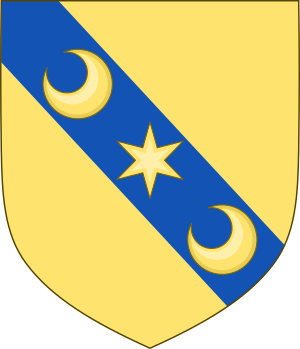Walter Scott, 1st Lord Scott of Buccleuch facts for kids
Walter Scott, 5th of Buccleuch, 1st Lord Scott of Buccleuch (born in 1565 – died on December 15, 1611) was an important Scottish nobleman. He was also a famous Border Reiver, which means he was part of groups who raided across the border between Scotland and England. People called him "Bold Buccleuch" because he was brave. He is most famous for leading a daring rescue mission known as Kinmont Willie's Raid.
Contents
Early Life and Family
Walter Scott was the son of Sir Walter Scott, 4th of Buccleuch. His mother was Margaret Douglas.
Becoming a Leader
Walter Scott was given the title of Knight by James VI of Scotland on May 17, 1590. This happened during the celebration of Anne of Denmark becoming Queen. Later, he was given important jobs like "Keeper of Liddesdale" and "Warden of the West March." These roles meant he was in charge of keeping peace and order in areas along the Scottish-English border.
Scott was involved in some troubles with his stepfather, the Earl of Bothwell. He traveled to other countries, including Italy, in 1591. In 1592, he was allowed to come back to Scotland. He became Keeper of Liddesdale again in 1594.
In August 1594, he took part in a special event called a tournament. This was for the baptism of Prince Henry. He dressed up like an Amazon warrior for the show.
Raids and Border Conflicts
In 1595 and 1597, Walter Scott led groups of men into Tynedale in England. These were raids where they would take things and sometimes burn houses. During these raids, they caused a lot of damage.
The Rescue of Kinmont Willie
One of the most famous things Walter Scott did was rescue a man named Kinmont Willie Armstrong. Kinmont Willie was a well-known Border Reiver. English soldiers captured him on March 17, 1596, even though there was a truce (a time when fighting was supposed to stop). They took him to Carlisle and put him in Carlisle Castle.
Walter Scott, as the Keeper of Liddesdale, asked the English leader to let Kinmont Willie go. But his request was not successful. So, on the night of April 13, 1596, Buccleuch decided to rescue him. He led about 80 men to Carlisle.
A small group went to the castle where Kinmont Willie was held. Their ladders were too short to climb the walls. So, they either broke through a small back gate or paid someone inside the castle to open it. They found Kinmont Willie's cell and freed him! They brought him safely back across the Scottish border. No one was hurt or killed during this daring rescue.
This raid on Carlisle caused a big problem between England and Scotland. It looked like the two countries might go to war. To prevent this, Walter Scott gave himself up to the English authorities. He was found guilty and sent to London.
When Walter Scott met Queen Elizabeth I in London, she asked him how he dared to do such a risky thing. He bravely replied, "What is it that a man dare not do?" Queen Elizabeth was surprised by his answer. She told one of her lords that with ten thousand men like him, the King of Scotland could challenge any throne in Europe.
In Literature
Walter Scott's relative, the famous author Sir Walter Scott, wrote down a well-known ballad (a type of song or poem) about the raid. It is called Kinmont Willie and can be found in his book Minstrelsy of the Scottish Border, Vol. 1.
Lord Scott of Buccleuch
In 1606, King James made Walter Scott a "Lord of Parliament." This meant he became Lord Scott of Buccleuch.
From 1604 to 1609, Walter Scott led a group of Borderers. They served Maurice of Nassau, Prince of Orange during a conflict called the Dutch Revolt.
Death
Walter Scott passed away on December 15, 1611. He was buried at St Mary's Kirk in Hawick.
Family
Walter Scott married Mary Kerr. They had four children:
- Walter Scott, 1st Earl of Buccleuch (died November 20, 1633)
- Margaret Scott (died October 5, 1651). She married James Ross, 6th Lord Ross first, and then Alexander Montgomerie, 6th Earl of Eglinton.
- Elizabeth Scott. She married John Cranstoun, who later became the 2nd Lord Cranstoun.
- Jean Scott (died after November 21, 1613).
Walter Scott also had other children.
See also
| Peerage of Scotland | ||
|---|---|---|
| New creation | Lord Scott of Buccleuch 1606–1611 |
Succeeded by Walter Scott |
 | DeHart Hubbard |
 | Wilma Rudolph |
 | Jesse Owens |
 | Jackie Joyner-Kersee |
 | Major Taylor |


